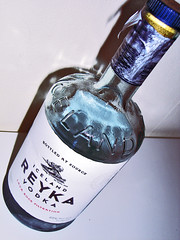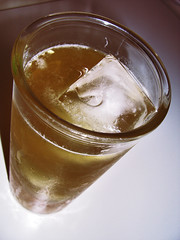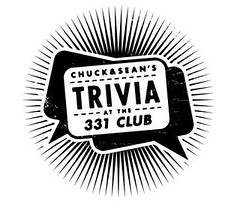 This might be part of the appeal of vodka, which has fast risen to be one of America's most popular liquors. There's a joke in cocktail snob circles: When you hear a customer at a bar say "I don't like the way it tastes," you can immediately translate that as "I can taste the liquor." Contemporary drinkers just don't like the flavor of traditional alcohols, it seems, unless they are easily masked by sugars and fruits, which may be why rums and tequilas sell so much better than gin.
This might be part of the appeal of vodka, which has fast risen to be one of America's most popular liquors. There's a joke in cocktail snob circles: When you hear a customer at a bar say "I don't like the way it tastes," you can immediately translate that as "I can taste the liquor." Contemporary drinkers just don't like the flavor of traditional alcohols, it seems, unless they are easily masked by sugars and fruits, which may be why rums and tequilas sell so much better than gin.For such drinkers, flavorless vodkas are ideal. They essentially function as a diluent: Making a cocktail with them is a little like adding alcoholic water to a drink (note that vodka, translated liberally, actually means "little water.") This is part of the reason we at the Bottle Gang are so opposed to the idea of a vodka martini. The taste of the martini is based around the complex relationship between the flavors of gin and vermouth. With a vodka martini, you are basically drinking a cocktail that tastes like diluted vermouth. And, since many bartenders are afraid even to use vermouth, as customers complain about the flavor of it, in many cases, you're drinking a drink where the strongest flavor is the garnish. We suspect this is why infused and flavored vodkas are starting to gain in popularity. After all, just because a drinker doesn't want their cocktail to taste like alcohol doesn't mean they want their cocktail to taste like nothing at all.
But don't let these prefatory comments fool you: Our complain is not against vodka. Firstly, there are many vodkas that do have a native flavor, or are infused in a distinct way, such as Bison Grass vodka, which we will write about soon. Secondly, there is a place in mixology for a well-made neutral spirit. There's a great logic to Ian Flemming's use of vodka in the Vesper, for example. Without it, he had concocted a drink that was just gin and Lillet, which, at the time, was high in quinine, and quite bitter. The addition of vodka to the recipe diluted the bitterness, making the final drink far more palatable.
 The first popular vodka cocktail was the Moscow Mule -- in fact, in the 1950s, it created the vodka craze in this country. At that time, Smirnoff was just trying to break the American market, without much success: it was actually marketed as "white whiskey" in South Carolina. But the owner of the distribution rights to Smirnoff, a fellow named John G. Martin, happened to have drinks in an LA bar called the Cock 'n' Bull Tavern with the proprietor, Jack Morgan. As it happened, Morgan had purchased quite a lot of ginger beer, and was having trouble moving it, and so the two conceived a cocktail that mixed these two unpopular ingredients. And so: vodka, ginger beer, and lime juice, and you have a Moscow Mule. The resulting drink was a smash, and with good reason -- it's delicious. Ginger beer has a very strong flavor, one that is not vastly diminished by the addition of vodka. The result tastes much like you would expect: Like beer with lime and ginger added.
The first popular vodka cocktail was the Moscow Mule -- in fact, in the 1950s, it created the vodka craze in this country. At that time, Smirnoff was just trying to break the American market, without much success: it was actually marketed as "white whiskey" in South Carolina. But the owner of the distribution rights to Smirnoff, a fellow named John G. Martin, happened to have drinks in an LA bar called the Cock 'n' Bull Tavern with the proprietor, Jack Morgan. As it happened, Morgan had purchased quite a lot of ginger beer, and was having trouble moving it, and so the two conceived a cocktail that mixed these two unpopular ingredients. And so: vodka, ginger beer, and lime juice, and you have a Moscow Mule. The resulting drink was a smash, and with good reason -- it's delicious. Ginger beer has a very strong flavor, one that is not vastly diminished by the addition of vodka. The result tastes much like you would expect: Like beer with lime and ginger added.So there are great cocktails out there for vodkas, assuming the liquor is being used as an ingredient, rather than as a substitute for an ingredient, as in the vodka martini. It is worth noting that with a really good neutral vodka, such as Reyka, the favor of the cocktail is going to be defined by the other ingredients -- if you're going to make a Screwdriver or a Harvey Wallbanger, it won't do to use anything but fresh orange juice. If you're going to make a White Russian, get a quality coffee liqueur and fresh cream. Also, forget about drinking it in shots: The only native flavor to Reyka, and other premium vodkas, is the taste of ethyl alcohol, which tastes exactly like rubbing alcohol smells. Reyka does take on other flavors exceptionally well, though. We tossed in a few grains of freshly ground pepper, and the resulting shot of vodka was one of the best pepper shots we've enjoyed. For people who make their own infused vodka at home (a topic we plan to cover soon), Reyka is an excellent choice.
There is one thing we can say about premium vodkas, and particularly about Reyka. They have been among the most ecologically conscious liquors manufactured. Reyka is proudly green, from the geothermal steam used to heat their plant to the indigenous lava used to filter the vodka. Most vodka, by comparison, is filtered through charcoal made from trees. This is a strong selling point for Reyka, as it is hard to select a neutral vodka on the basis of which tastes better. (SPARBER)

 2 oz. whiskey
2 oz. whiskey


4 comments:
I have found Reyka to be the best vodka i've drank to date. that is what true vodka should be, just alcohol and water. A very smooth vodka, great mixer too. I find it is very great neat with no ice, chilled that is.
Better than SKYY vodka, and 10 times better than Grey Goose.
I have tasted many different Vodkas from the skull to grey goose, sky, and yes five o' clock :( To say that Reyka has no flavor is not true. Yes, there is no fruit or harsh alcohol taste. But, you can gain the lava rock filtering and nothing tastes better than fresh and I mean fresh pure clean water. The smell of Reyka is another thing. No harsh rubbing alcohol smell you get with other high end brands. You can almost smell the lava rocks and the water they use. Reyka goes down so smooth and doesn't treat you harshly for enjoying it's texture. Yes texture, in a vodka. Its' texture is like glycerin in your mouth, loose and smooth like sliding and ice cube around your mouth. So,next time you pick up a bottle of Reyka just give it a chance on it's own first. This vodka also treats you well in the morning after a good night out with your best friends. Reyka and any fruit juice is good for me. But, a favorite of mine is Reyka, Pomegranate liqueur, and 100% blue berry/Pomegranate juice chilled no ice. Very nice. One of the best. Reyka.
I have tasted many different Vodkas from the skull to grey goose, sky, and yes five o' clock :( To say that Reyka has no flavor is not true. Yes, there is no fruit or harsh alcohol taste. But, you can gain the lava rock filtering and nothing tastes better than fresh and I mean fresh pure clean water. The smell of Reyka is another thing. No harsh rubbing alcohol smell you get with other high end brands. You can almost smell the lava rocks and the water they use. Reyka goes down so smooth and doesn't treat you harshly for enjoying it's texture. Yes texture, in a vodka. Its' texture is like glycerin in your mouth, loose and smooth like sliding and ice cube around your mouth. So,next time you pick up a bottle of Reyka just give it a chance on it's own first. This vodka also treats you well in the morning after a good night out with your best friends. Reyka and any fruit juice is good for me. But, a favorite of mine is Reyka, Pomegranate liqueur, and 100% blue berry/Pomegranate juice chilled no ice. Very nice. One of the best. Reyka.
Where has Reyka Vodka Gone???????????? I have not been able to find it anywhere in NorthJersey? Does anyone know where it can be purchased? It was great to keep in the freezer and just sip . Miss It.
Post a Comment